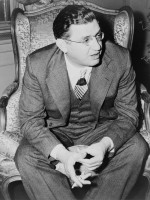Ben Hecht is a Actor, Director, Scriptwriter, Producer and Additional Writing American born on 28 february 1894 at New York City (USA)

Ben Hecht (/ˈhɛkt/ HEKT; 1894–1964) was an American screenwriter, director, producer, playwright, and novelist. Called "the Shakespeare of Hollywood", he received screen credits, alone or in collaboration, for the stories or screenplays of some seventy films and as a prolific storyteller, authored thirty-five books and created some of the most entertaining screenplays and plays in America. Film historian Richard Corliss called him "the Hollywood screenwriter", someone who "personified Hollywood itself." The Dictionary of Literary Biography - American Screenwriters calls him "one of the most successful screenwriters in the history of motion pictures."
He was the first screenwriter to receive an Academy Award for Original Screenplay, for the movie Underworld (1927). The number of screenplays he wrote or worked on that are now considered classics is, according to Chicago's Newberry Library, "astounding," and included films such as, Scarface (1932), The Front Page, Twentieth Century (1934), Barbary Coast (1935), Nothing Sacred (1937), Some Like It Hot, Gone with the Wind, Gunga Din, Wuthering Heights, (all 1939), His Girl Friday (1940), Spellbound (1945), Notorious (1946), Monkey Business, A Farewell to Arms (1957), Mutiny on the Bounty (1962), and Casino Royale (released posthumously, in 1967). He also provided story ideas for such films as Stagecoach (1939). In 1940, he wrote, produced, and directed, Angels Over Broadway, which was nominated for Best Screenplay. In total, six of his movie screenplays were nominated for Academy Awards, with two winning.
He became an active Zionist shortly before the Holocaust began in Germany, and as a result wrote articles and plays about the plight of European Jews, such as, We Will Never Die in 1943 and A Flag is Born in 1946. Of his seventy to ninety screenplays, he wrote many anonymously to avoid the British boycott of his work in the late 1940s and early 1950s. The boycott was a response to Hecht's active support of paramilitary action against British forces in Palestine and sabotaging British property there (see below), during which time a supply ship to Palestine was named the S. S. Ben Hecht.
He could produce a screenplay in two weeks and, according to his autobiography, never spent more than eight weeks on a script. Yet he was still able to produce mostly rich, well-plotted, and witty screenplays. His scripts included virtually every movie genre: adventures, musicals, and impassioned romances, but ultimately, he was best known for two specific types of film: crime thrillers and screwball comedies. Despite his success, however, he disliked the effect that movies were having on the theater, American cultural standards, and on his own creativity.
À 25 ans, en 1919, il élargit ses horizons, voyageant en Allemagne et en Russie, où il travaille comme correspondant étranger pour 75 journaux dont les principaux sont le Daily News et le Globe. C'est à son retour qu'il s'essaie aux romans, débutant avec éclat avec Erik Dorn ; dès le début des années 1920, il devient un romancier satirique à succès.
Après une laborieuse retraite de quatre années, il reparaît en 1931 avec un nouveau roman Un juif amoureux (A Jew in Love), qui est, de l'avis unanime, son chef-d'œuvre, et dont le triomphe fait sensation dans tous les pays de langue anglaise. Il est alors choisi par Josef von Sternberg qui lui confie le scénario des Nuits de Chicago, film qui inspire les premiers films de gangsters parlant, comme Scarface, dont Ben Hecht sera également le scénariste. Les Nuits de Chicago permet à Ben Hecht de remporter son premier Oscar du meilleur scénario (Oscar de la meilleure histoire originale). Par la suite, ce faux cynique devient l'un des scénaristes de Howard Hawks, Otto Preminger, Henry Hathaway ou d'Alfred Hitchcock et de l'éblouissant La Dame du vendredi.
Lorsque les nouvelles faisant état du sort des juifs en Europe occupée parviennent aux États-Unis, Ben Hecht crée une pièce de théâtre intitulée « Nous ne mourrons jamais » et destinée à attirer l’attention du public sur l'holocauste. Le chanteur Franck Sinatra se mobilise et, en 1943, participe à la tournée nationale de cette pièce.
Ben Hecht est aussi l'auteur de la pièce de théâtre Spéciale Première (The Front Page) adaptée à l'écran par Billy Wilder en 1974.
Il est également connu pour son engagement sioniste et pour son livre Perfidy à charge contre Rudolf Kastner, notable juif hongrois qui négocia l'envoi en Suisse de 1 600 Juifs hongrois contre une rançon et le maintien du reste de la communauté dans l'ignorance du sort final qui l'attendait.
 (1940)
(1940)
(Writer) (1963)
(1963)
(Writer) (1983)
(1983)
(Original Film Writer) (1946)
(1946)
(Writer) (1946)
(1946)
(Writer)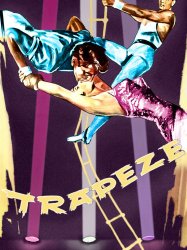 (1956)
(1956)
(Writer)
Source : Wikidata
Ben Hecht

- Infos
- Photos
- Best films
- Family
- Characters
- Awards
Nationality USA
Birth 28 february 1894 at New York City (USA)
Death 18 april 1964 (at 70 years) at New York City (USA)
Awards Academy Award for Best Story
Birth 28 february 1894 at New York City (USA)
Death 18 april 1964 (at 70 years) at New York City (USA)
Awards Academy Award for Best Story
Ben Hecht (/ˈhɛkt/ HEKT; 1894–1964) was an American screenwriter, director, producer, playwright, and novelist. Called "the Shakespeare of Hollywood", he received screen credits, alone or in collaboration, for the stories or screenplays of some seventy films and as a prolific storyteller, authored thirty-five books and created some of the most entertaining screenplays and plays in America. Film historian Richard Corliss called him "the Hollywood screenwriter", someone who "personified Hollywood itself." The Dictionary of Literary Biography - American Screenwriters calls him "one of the most successful screenwriters in the history of motion pictures."
He was the first screenwriter to receive an Academy Award for Original Screenplay, for the movie Underworld (1927). The number of screenplays he wrote or worked on that are now considered classics is, according to Chicago's Newberry Library, "astounding," and included films such as, Scarface (1932), The Front Page, Twentieth Century (1934), Barbary Coast (1935), Nothing Sacred (1937), Some Like It Hot, Gone with the Wind, Gunga Din, Wuthering Heights, (all 1939), His Girl Friday (1940), Spellbound (1945), Notorious (1946), Monkey Business, A Farewell to Arms (1957), Mutiny on the Bounty (1962), and Casino Royale (released posthumously, in 1967). He also provided story ideas for such films as Stagecoach (1939). In 1940, he wrote, produced, and directed, Angels Over Broadway, which was nominated for Best Screenplay. In total, six of his movie screenplays were nominated for Academy Awards, with two winning.
He became an active Zionist shortly before the Holocaust began in Germany, and as a result wrote articles and plays about the plight of European Jews, such as, We Will Never Die in 1943 and A Flag is Born in 1946. Of his seventy to ninety screenplays, he wrote many anonymously to avoid the British boycott of his work in the late 1940s and early 1950s. The boycott was a response to Hecht's active support of paramilitary action against British forces in Palestine and sabotaging British property there (see below), during which time a supply ship to Palestine was named the S. S. Ben Hecht.
He could produce a screenplay in two weeks and, according to his autobiography, never spent more than eight weeks on a script. Yet he was still able to produce mostly rich, well-plotted, and witty screenplays. His scripts included virtually every movie genre: adventures, musicals, and impassioned romances, but ultimately, he was best known for two specific types of film: crime thrillers and screwball comedies. Despite his success, however, he disliked the effect that movies were having on the theater, American cultural standards, and on his own creativity.
Biography
Issu de parents immigrants juifs, il a une enfance et une jeunesse assez mouvementées et ne fait que des études très irrégulières. Son grand-père paternel était un talmudiste et érudit, mais le jeune Ben est surtout élevé par deux tantes sans enfants, qui disputèrent à ses parents la direction de son éducation. Il étudie le violon à Chicago, où sa famille emménage, et il y demeure jusqu'à l'âge de 12 ans. Il progresse avec assez de succès pour donner un récital. Un peu plus tard, sa famille s'installe au bord du lac Michigan, dans la petite ville de Racine, au Wisconsin. Ben Hecht songe à entrer à l'université, mais un ami de son père lui propose un emploi de journaliste qu'il accepte. Dès l'âge de 17 ans, il écrit des nouvelles pour le Chicago Journal et devient six mois plus tard le premier reporter de cette publication importante, grâce à sa fantaisie aussi hardie qu'imperturbable et à son imagination féconde et sans scrupules.À 25 ans, en 1919, il élargit ses horizons, voyageant en Allemagne et en Russie, où il travaille comme correspondant étranger pour 75 journaux dont les principaux sont le Daily News et le Globe. C'est à son retour qu'il s'essaie aux romans, débutant avec éclat avec Erik Dorn ; dès le début des années 1920, il devient un romancier satirique à succès.
Après une laborieuse retraite de quatre années, il reparaît en 1931 avec un nouveau roman Un juif amoureux (A Jew in Love), qui est, de l'avis unanime, son chef-d'œuvre, et dont le triomphe fait sensation dans tous les pays de langue anglaise. Il est alors choisi par Josef von Sternberg qui lui confie le scénario des Nuits de Chicago, film qui inspire les premiers films de gangsters parlant, comme Scarface, dont Ben Hecht sera également le scénariste. Les Nuits de Chicago permet à Ben Hecht de remporter son premier Oscar du meilleur scénario (Oscar de la meilleure histoire originale). Par la suite, ce faux cynique devient l'un des scénaristes de Howard Hawks, Otto Preminger, Henry Hathaway ou d'Alfred Hitchcock et de l'éblouissant La Dame du vendredi.
Lorsque les nouvelles faisant état du sort des juifs en Europe occupée parviennent aux États-Unis, Ben Hecht crée une pièce de théâtre intitulée « Nous ne mourrons jamais » et destinée à attirer l’attention du public sur l'holocauste. Le chanteur Franck Sinatra se mobilise et, en 1943, participe à la tournée nationale de cette pièce.
Ben Hecht est aussi l'auteur de la pièce de théâtre Spéciale Première (The Front Page) adaptée à l'écran par Billy Wilder en 1974.
Il est également connu pour son engagement sioniste et pour son livre Perfidy à charge contre Rudolf Kastner, notable juif hongrois qui négocia l'envoi en Suisse de 1 600 Juifs hongrois contre une rançon et le maintien du reste de la communauté dans l'ignorance du sort final qui l'attendait.
Best films
 (1940)
(1940)(Writer)
 (1963)
(1963)(Writer)
 (1983)
(1983)(Original Film Writer)
 (1946)
(1946)(Writer)
 (1946)
(1946)(Writer)
 (1956)
(1956)(Writer)
Usually with
Filmography of Ben Hecht (139 films)
Actor
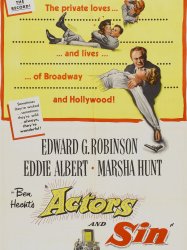
Actors and Sin (1952)
, 1h22Directed by Lee Garmes, Ben Hecht
Origin USA
Genres Drama, Comedy, Comedy-drama
Actors Edward G. Robinson, Eddie Albert, Dan O'Herlihy, Marsha Hunt, Peter Brocco, Jack Warner
Roles Narrator (segment "Woman of Sin") (voice)
Rating53%





The film lampoons the Hollywood motion picture industry and is separated into two sections: The first section of the film is Actor's Blood, a morality play about legitimate theater. The second section is Woman of Sin, a send-up of Hollywood greed.

Angels Over Broadway (1940)
, 1h19Directed by Lee Garmes, Ben Hecht
Origin USA
Genres Drama, Comedy, Noir, Crime
Actors Douglas Fairbanks, Jr., Rita Hayworth, Thomas Mitchell, John Qualen, Constance Worth, Harry Antrim
Roles Man in Night Court (uncredited)
Rating64%





Bill O'Brien is a New York con man in search of a suitable gullible person to make some money on. In a fancy nightclub he finds Charles Engle, a man ridden by guilt and on the brink of committing suicide after embezzling a large sum of money that he has spent on his high-maintenance wife.

The Scoundrel (1935)
, 1h16Directed by Ben Hecht, Charles MacArthur
Origin USA
Genres Drama
Themes Ghost films
Actors Julie Haydon, Noël Coward, Harry Davenport, Stanley Ridges, Martha Sleeper, Rosita Moreno
Roles Flop House Bum
Rating61%





Anthony Mallare (Coward) is a publisher who (it appears) wishes to ruin the life of every person he comes in contact with. Every sentence he says is like a poisoned dart aimed for the greatest damage, and delivered in cold lifeless tones. He is under no illusion regarding his own personality, remarking to his staff at large that he has found the perfect woman - one as empty as he is: "I must marry her......it would be like two empty paper bags belaboring one another". He finally manages to completely destroy the career and life of an aspiring young author (Ridges) and his girlfriend (Haydon), who curses him with the hope that he will die friendless. Shortly afterwards he is killed when his plane crashes into the ocean—Haydon's character, upon hearing of the tragedy, remarks, "I've just found out there IS a God!"
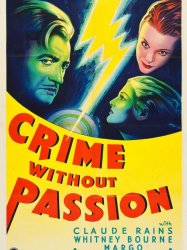
Crime Without Passion (1934)
, 1h10Directed by Lee Garmes, Ben Hecht, Charles MacArthur
Origin USA
Genres Drama, Crime
Actors Claude Rains, Margo, Stanley Ridges, Whitney Bourne, Fanny Brice, Helen Hayes
Roles Court Interviewer with Pipe (uncredited)
Rating70%





Director

Actors and Sin (1952)
, 1h22Directed by Lee Garmes, Ben Hecht
Origin USA
Genres Drama, Comedy, Comedy-drama
Actors Edward G. Robinson, Eddie Albert, Dan O'Herlihy, Marsha Hunt, Peter Brocco, Jack Warner
Rating53%





The film lampoons the Hollywood motion picture industry and is separated into two sections: The first section of the film is Actor's Blood, a morality play about legitimate theater. The second section is Woman of Sin, a send-up of Hollywood greed.
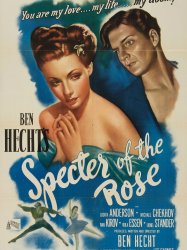
Specter of the Rose (1946)
, 1h30Directed by Ben Hecht
Origin USA
Genres Drama, Thriller
Themes Dance films
Actors Judith Anderson, Michael Chekhov, Lionel Stander, Billy Gray, Ferike Boros
Rating57%





A male ballet superstar (Kirov) is suspected of murdering his first wife (his former ballet partner) and now possibly threatening his new wife and ballet partner (Essen). Anderson plays an embittered ballet teacher, and Chekhov plays an impresario.

Angels Over Broadway (1940)
, 1h19Directed by Lee Garmes, Ben Hecht
Origin USA
Genres Drama, Comedy, Noir, Crime
Actors Douglas Fairbanks, Jr., Rita Hayworth, Thomas Mitchell, John Qualen, Constance Worth, Harry Antrim
Rating64%





Bill O'Brien is a New York con man in search of a suitable gullible person to make some money on. In a fancy nightclub he finds Charles Engle, a man ridden by guilt and on the brink of committing suicide after embezzling a large sum of money that he has spent on his high-maintenance wife.

Soak the Rich (1936)
, 1h27Directed by Ben Hecht, Charles MacArthur
Origin USA
Genres Drama, Comedy
Actors Walter Connolly, John Howard, Lionel Stander, Ilka Chase, Francis Compton, Percy Kilbride
Rating61%






The Scoundrel (1935)
, 1h16Directed by Ben Hecht, Charles MacArthur
Origin USA
Genres Drama
Themes Ghost films
Actors Julie Haydon, Noël Coward, Harry Davenport, Stanley Ridges, Martha Sleeper, Rosita Moreno
Rating61%





Anthony Mallare (Coward) is a publisher who (it appears) wishes to ruin the life of every person he comes in contact with. Every sentence he says is like a poisoned dart aimed for the greatest damage, and delivered in cold lifeless tones. He is under no illusion regarding his own personality, remarking to his staff at large that he has found the perfect woman - one as empty as he is: "I must marry her......it would be like two empty paper bags belaboring one another". He finally manages to completely destroy the career and life of an aspiring young author (Ridges) and his girlfriend (Haydon), who curses him with the hope that he will die friendless. Shortly afterwards he is killed when his plane crashes into the ocean—Haydon's character, upon hearing of the tragedy, remarks, "I've just found out there IS a God!"

Crime Without Passion (1934)
, 1h10Directed by Lee Garmes, Ben Hecht, Charles MacArthur
Origin USA
Genres Drama, Crime
Actors Claude Rains, Margo, Stanley Ridges, Whitney Bourne, Fanny Brice, Helen Hayes
Rating70%






Design for Living (1933)
, 1h31Directed by Ernst Lubitsch, Ben Hecht
Origin USA
Genres Comedy, Romance
Themes Films about sexuality, Théâtre, Films based on plays, Adaptation d'une pièce de théâtre de Noel Coward
Actors Gary Cooper, Fredric March, Miriam Hopkins, Edward Everett Horton, Franklin Pangborn, Wyndham Standing
Rating73%





While en route to Paris via train, commercial artist Gilda Farrell meets artist George Curtis and playwright Thomas Chambers, fellow Americans who share an apartment in the French capital. Gilda works for advertising executive Max Plunkett, who has had no success in his efforts to engage her in a romantic relationship. Tom and George each realizes the other is in love with Gilda, and although they agree to forget her, they cannot resist her when she comes to visit. Unable to choose between the two, she proposes she live with them as a friend, muse, and critic—with the understanding they will not have sex.
Scriptwriter
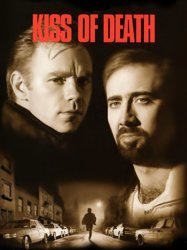
Kiss of Death (1995)
, 1h37Directed by Barbet Schroeder
Origin USA
Genres Drama, Thriller, Action, Crime
Actors David Caruso, Nicolas Cage, Samuel L. Jackson, Helen Hunt, Ving Rhames, Stanley Tucci
Roles Original Film Writer
Rating58%





Jimmy Kilmartin is an ex-con living in Astoria in the New York City borough of Queens, trying to stay clean and raising a daughter with his wife Bev. They are both recovering alcoholics. Bev leaves Jimmy alone to go to an AA meeting. While she is gone, Jimmy is awoken by his cousin Ronnie who is in desperate need of a driver to help him move some stolen cars. Jimmy tries to eject Ronnie, knowing that he could go back to prison just for being seen with him. Ronnie's right ring finger is broken, and he confesses that if Jimmy does not help him move the cars, Little Junior Brown will kill him.
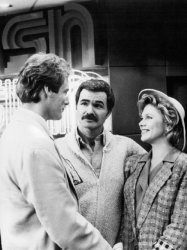
Switching Channels (1988)
, 1h45Directed by Ted Kotcheff
Origin USA
Genres Comedy, Romantic comedy
Themes Films about writers, Films about journalists, Films about television, Théâtre, Films based on plays, Films about marriage
Actors Kathleen Turner, Burt Reynolds, Christopher Reeve, Ned Beatty, Henry Gibson, George Newbern
Roles Writer
Rating59%





Sullivan (Reynolds) is the operations manager of Satellite News Network, a fictitious cable TV news channel. He tries to prevent the impending marriage of Colleran (Turner), his best reporter and ex-wife, by keeping her on the job during the critical news coverage of an upcoming execution and prison break.
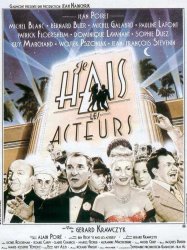
I Hate Actors (1986)
, 1h30Directed by Gérard Krawczyk
Origin France
Genres Comedy
Actors Pauline Lafont, Patrick Floersheim, Dominique Lavanant, Jean Poiret, Michel Galabru, Bernard Blier
Roles Novel
Rating58%





Grandeur et décadence à Hollywood, dans les années 1940. Un producteur tyrannique, un réalisateur paranoïaque, une starlette fiancée vingt-quatre fois, un acteur qui refuse de vieillir... le tout sur fond de meurtres en série.

Scarface (1983)
, 2h50Directed by Brian De Palma
Origin USA
Genres Drama, Thriller, Mob film, Action, Adventure, Crime
Themes Films about families, Films about immigration, Mafia films, Medical-themed films, Films about drugs, La précarité, Gangster films
Actors Al Pacino, Steven Bauer, Michelle Pfeiffer, Mary Elizabeth Mastrantonio, Robert Loggia, Paul Shenar
Roles Original Film Writer
Rating82%





In 1980, Cuban refugee Antonio "Tony" Montana (Al Pacino) arrives in Miami, where he is sent to a refugee camp with his best friend Manny Ribera (Steven Bauer) and their associates Angel (Pepe Serna) and Chi-Chi (Ángel Salazar). The four are released from the camp in exchange for assassinating a former Cuban government official at the request of wealthy drug dealer Frank Lopez (Robert Loggia), and they are given green cards. They become dishwashers in a diner.
 Connection
Connection




